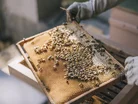
A new study suggests honeybees have the potential to inspire the future of AI.
The research, conducted by the University of Sheffield, reveals bees can make fast and accurate decisions that could help design more efficient robots and autonomous machines.
Despite bees having a brain the size of a sesame seed, study authors are reverse-engineering the honeybee brain to enable robots and autonomous vehicles to see, sense, navigate and make similar decisions. This study reinforces how integral bees are to the food industry and how it would be diminished without them.
The power of insects: a positive technological impact
The study, co-led by Dr Hadi Mabhoudi from the University’s Department of Computer Science – and Professor Andrew Barron from Macquarie University in Sydney – has uncovered the complex strategies that honeybees use to decide on the best flowers to explore.
It reveals how bees make quick, accurate decisions about where to forage for nectar. Moreover, their decisions are better than comparable decisions in humans.
The study trained 20 bees to recognise five different-coloured artificial flowers. These included flowers that contained sugar syrup, those that contained tonic water – which bees dislike – while others offered glucose.
Results confirmed that if the bees are confident a flower contained food, they landed on it in an average time of just 0.6 seconds. They shunned non-feeding flowers just as quickly. Scientists then built a computer model to replicate the bees’ decision-making and found their computer model resembled the physical layout of a honeybee brain.
Sheffield scientists now hope honeybee brains will inspire a new generation of autonomous machines.
Protecting pollinators protects food supply chains
The world of bees and pollinators more generally continue to have a huge impact on human existence and food supply chains, yet bee populations are declining across the world at an alarming rate.
Many of the plants that bees pollinate are used to make animal feed for farm animals. The most common fish foods used by commercial fish farms also contain plant products like oilseed rape, soya bean, and lupine, which are all pollinated by bees. They also pollinate wild trees and flowers which then support mammals and everything going up the food chain, supporting them with food.
Approximately one-third of honey bee species are dying out in the UK alone, with habitat loss a key factor. Globally, Forbes says pollinators are responsible for at least one out of every three bites of food we eat, which is more than 35%. Pollination also produces nearly US$20bn of food-related products annually, with honeybees responsible for US$15bn of food crops annually in the US alone.
The study also highlights how bees are not just important for food, but also other industries, such as construction, healthcare and technology.
Maboudi said: “What we’ve done in this study is reveal the underlying mechanisms which drive these remarkable decision-making capabilities.
“We can now use these to design better, more robust and risk-averse robots and autonomous machines that can think like bees - some of the most efficient navigators in the natural world.”



